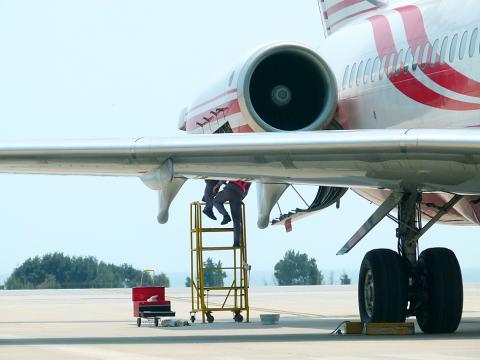A bird-strike may have been the cause of an in-flight engine shutdown on a Far Eastern Air Transport (FAT, 遠東航空) plane yesterday, the local carrier said.
The incident occurred about 12 minutes after the aircraft took off from Kinmen at 11:50am, when the captain noticed that the engine was malfunctioning, the airline said in a statement, adding that the captain followed routine procedure by shutting off the malfunctioning turbine and returning to Kinmen Airport using the remaining engine.
According to several passenger accounts, a dull booming sound was heard in the cabin during the flight.

Photo: Wu Cheng-ting, Taipei Times
All 150 passengers and crew members, including three infants, were safe after the incident forced the captain to abort the flight and return to Kinmen. After landing at 12:15pm, the airline found another flight to take the passengers to Taiwan proper, after a three-hour delay.
The plane was immediately serviced by FAT maintenance crews, who agreed with the captain’s assessment that something, probably a bird, had been drawn into the engine.
The Civil Aeronautics Administration (CAA), the country’s top aviation regulator, said that the exact cause of the engine shutdown would require further investigation.
It was the fourth case of an in-flight engine shutdown involving an FAT aircraft since the carrier resumed services less than two years ago.
CAA Flight Standards division chief Chang Ling-ti (張羚悌) said that if the incident was caused by a bird being drawn into the engine, it showed that birds were an increasing menace to flight safety.
According to CAA statistics, flights that were delayed or forced to land due to incidents involving birds have been on the rise in recent years, with 73 incidents in 2010, 115 in 2011 and 260 last year.
Thirty-six of the incidents caused the planes to suffer some sort of damage.
CAA Air Navigation Facilities division chief Lin Hung-hsien (林宏憲) said that there were many reasons for the increasing numbers.
More flights is one reason, Lin said, but long-term observations by the administration showed that climate change has also directly affected bird habits.
The change has caused birds to appear near airports more often, Lin said, adding that other countries across the globe were experiencing the same problem.
An increasing number of countries are trying to find a solution, Lin said.
Additional reporting by CNA

OPTIMISTIC: The DGBAS sharply upgraded its GDP growth estimate from 3.54 percent to 7.71 percent after the Taiwan-US trade agreement signing and given AI optimism The US imported more from Taiwan than China for the first time in decades, as US President Donald Trump’s tariffs reshape trade flows while a global boom in artificial intelligence (AI) fuels demand for tech products. US purchases of goods from China plunged almost 44 percent in December last year from 2024 to US$21.1 billion, US Department of Commerce data showed on Thursday. By contrast, shipments from Taiwan more than doubled during the same period to US$24.7 billion. The soaring Taiwanese shipments to the US reflect the huge expansion in supplies of chips and servers for AI companies, which has completely changed

The Central Election Commission has amended election and recall regulations to require elected office candidates to provide proof that they have no Chinese citizenship, a Cabinet report said. The commission on Oct. 29 last year revised the Measures for the Permission of Family-based Residence, Long-term Residence and Settlement of People from the Mainland Area in the Taiwan Area (大陸地區人民在台灣地區依親居留長期居留或定居許可辦法), the Executive Yuan said in a report it submitted to the legislature for review. The revision requires Chinese citizens applying for permanent residency to submit notarial documents showing that they have lost their Chinese household record and have renounced — or have never

US and Chinese fighter jets briefly faced off above waters near the Korean Peninsula this week, Yonhap News agency reported, marking a rare confrontation in that area between the two superpowers. About 10 US fighter jets on Wednesday departed an airbase in Pyeongtaek, South Korea, for drills above international waters off South Korea’s western coast, the news outlet cited unidentified military sources as saying. While the US planes did not enter China’s air defense identification zone, Beijing scrambled planes as they neared that region, the report said. “The Chinese People’s Liberation Army organized naval and air forces to monitor and effectively respond

Taiwan has secured another breakthrough in fruit exports, with jujubes, dragon fruit and lychees approved for shipment to the EU, the Ministry of Agriculture said yesterday. The Animal and Plant Health Inspection Agency on Thursday received formal notification of the approval from the EU, the ministry said, adding that the decision was expected to expand Taiwanese fruit producers’ access to high-end European markets. Taiwan exported 126 tonnes of lychees last year, valued at US$1.48 million, with Japan accounting for 102 tonnes. Other export destinations included New Zealand, Hong Kong, the US and Australia, ministry data showed. Jujube exports totaled 103 tonnes, valued at